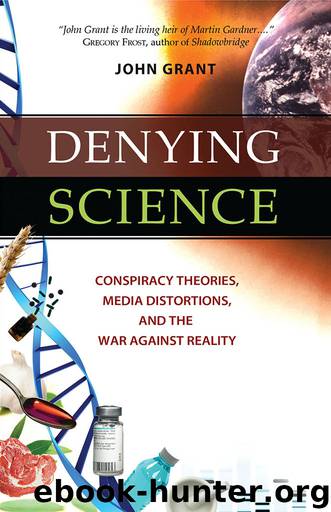Denying Science by John Grant

Author:John Grant
Language: eng
Format: epub
ISBN: 9781616144005
Publisher: Prometheus Books
Published: 2013-02-27T16:00:00+00:00
We’ve noted that ID is not so much a science or a pseudoscience as a political scheme, and the same is in a sense true of eugenics. It’s a belief system more than anything else. That the human species could be improved through positive eugenics (promotion of breeding between high-quality individuals) or negative eugenics (prevention of breeding between “undesirables”) goes back as far as Plato and probably farther. It was only after publication of Origin of Species in 1859, though, that the devotees of eugenics felt they had a good sciencey underpinning for their beliefs.
The major flaw in the claimed scientific underpinning of eugenics is that it depends on an overly simplistic version of Mendelian heredity. For example, eugenics ignores entirely the role of environment in development; yet as early as 1915 the work of Thomas Hunt Morgan et al. showed how important environmental factors were in the equation. In the human context, it was recognized early that a host of influences other than the genes an individual is born with—and not just the influences but the interactions between those influences—can affect the outcome. It is simply not the case that “good genes will out,” as the cliché has it: All other things being equal, they might; but all other things never are. A more efficient way of raising a population’s intelligence than any heredity-based stratagem is to improve its diet, and that’s even before we start to take education into consideration.
By far the most important figure in the early story of the eugenics movement is Francis Galton, a cousin of charles Darwin; they shared a grandfather—Erasmus Darwin—but had different grandmothers. Galton it was who coined the term “eugenics.”1 The contrasting view to eugenics came to be called euthenics, which sought to improve our lot through environmental reform.
Galton’s statistical research on the subject of human heredity persuaded him such qualities as intelligence were inherited, not learned. If good characteristics could be bred for, then that was what our species should be doing. Galton was a sort of christopher Monckton (see p. 00) predux, albeit with genuine scientific credentials. It was not part of his psychological makeup to doubt his own conclusions. His ideal of humanity was, unsurprisingly, the Anglo-Saxon model—people like Francis Galton, in fact. When eugenics became fashionable on the European continent, the preference was for Nordics, supposedly the pure descendants of the almighty Aryan race.
Galton was almost obsessively a racist. In his biography, Extreme Measures (2004), Martin Brookes examines this aspect in some detail. As noted above, Victorian England was by and large a racist society; even so, Galton was extreme. And yet his achievements shouldn’t be underestimated. Among much else, he identified the weather pattern called the anticyclone, devised the symbology we still use on meteorological maps, did pioneering work on the use of fingerprints, derived the statistical concept of the correlation coefficient, devised and used the psychological investigatory techniques of word association and the psychological questionnaire, and got closer than cousin charles did to working out the basic principles of heredity/genetics.
Download
This site does not store any files on its server. We only index and link to content provided by other sites. Please contact the content providers to delete copyright contents if any and email us, we'll remove relevant links or contents immediately.
Cecilia; Or, Memoirs of an Heiress — Volume 1 by Fanny Burney(32527)
Cecilia; Or, Memoirs of an Heiress — Volume 2 by Fanny Burney(31928)
Cecilia; Or, Memoirs of an Heiress — Volume 3 by Fanny Burney(31916)
The Great Music City by Andrea Baker(31899)
We're Going to Need More Wine by Gabrielle Union(19020)
All the Missing Girls by Megan Miranda(15889)
Pimp by Iceberg Slim(14464)
Bombshells: Glamour Girls of a Lifetime by Sullivan Steve(14038)
For the Love of Europe by Rick Steves(13817)
Talking to Strangers by Malcolm Gladwell(13331)
Norse Mythology by Gaiman Neil(13316)
Fifty Shades Freed by E L James(13216)
Mindhunter: Inside the FBI's Elite Serial Crime Unit by John E. Douglas & Mark Olshaker(9292)
Crazy Rich Asians by Kevin Kwan(9261)
The Lost Art of Listening by Michael P. Nichols(7476)
Enlightenment Now: The Case for Reason, Science, Humanism, and Progress by Steven Pinker(7287)
The Four Agreements by Don Miguel Ruiz(6728)
Bad Blood by John Carreyrou(6600)
Weapons of Math Destruction by Cathy O'Neil(6248)
